A Detailed Report on Henry Fayol's Management Theories and Impact
VerifiedAdded on 2023/06/06
|7
|1927
|70
Report
AI Summary
This report provides an in-depth analysis of Henry Fayol, a key management thinker, focusing on his life, career, and significant contributions to the field of management. It delves into Fayol's theory of Fayolism, his six industrial activities, and the five functions of management: planning, organizing, commanding, coordinating, and controlling. The report further elaborates on Fayol's 14 principles of management, including division of work, authority and responsibility, discipline, unity of command, and esprit de corps, illustrating their relevance in real-world organizations like Tesco. The conclusion highlights Fayol's remarkable contributions to management theory, emphasizing the enduring impact of his managerial functions and principles on modern business practices. Desklib provides access to similar solved assignments for students.

Individual written project on
a key management thinker
a key management thinker
Paraphrase This Document
Need a fresh take? Get an instant paraphrase of this document with our AI Paraphraser
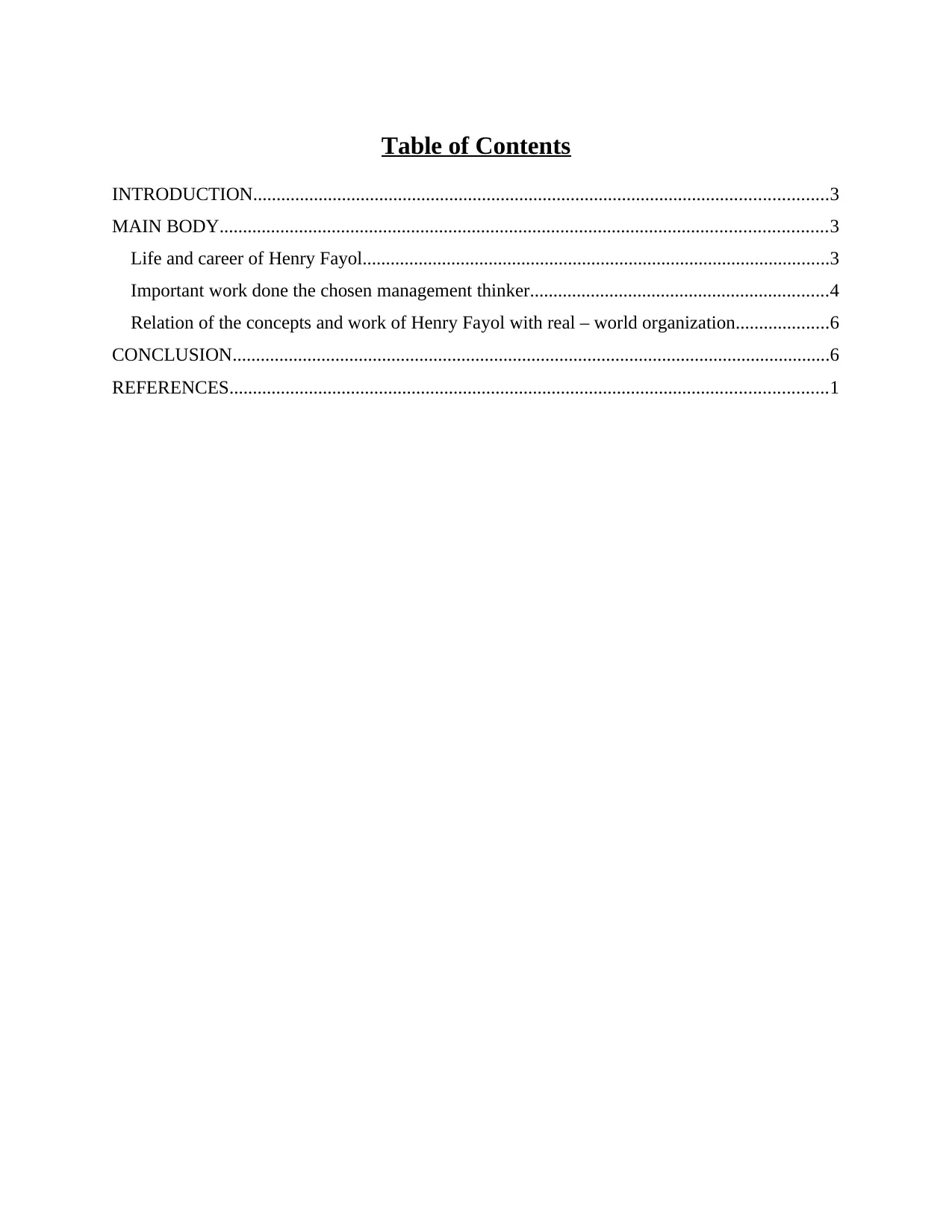
Table of Contents
INTRODUCTION...........................................................................................................................3
MAIN BODY..................................................................................................................................3
Life and career of Henry Fayol....................................................................................................3
Important work done the chosen management thinker................................................................4
Relation of the concepts and work of Henry Fayol with real – world organization....................6
CONCLUSION................................................................................................................................6
REFERENCES................................................................................................................................1
INTRODUCTION...........................................................................................................................3
MAIN BODY..................................................................................................................................3
Life and career of Henry Fayol....................................................................................................3
Important work done the chosen management thinker................................................................4
Relation of the concepts and work of Henry Fayol with real – world organization....................6
CONCLUSION................................................................................................................................6
REFERENCES................................................................................................................................1
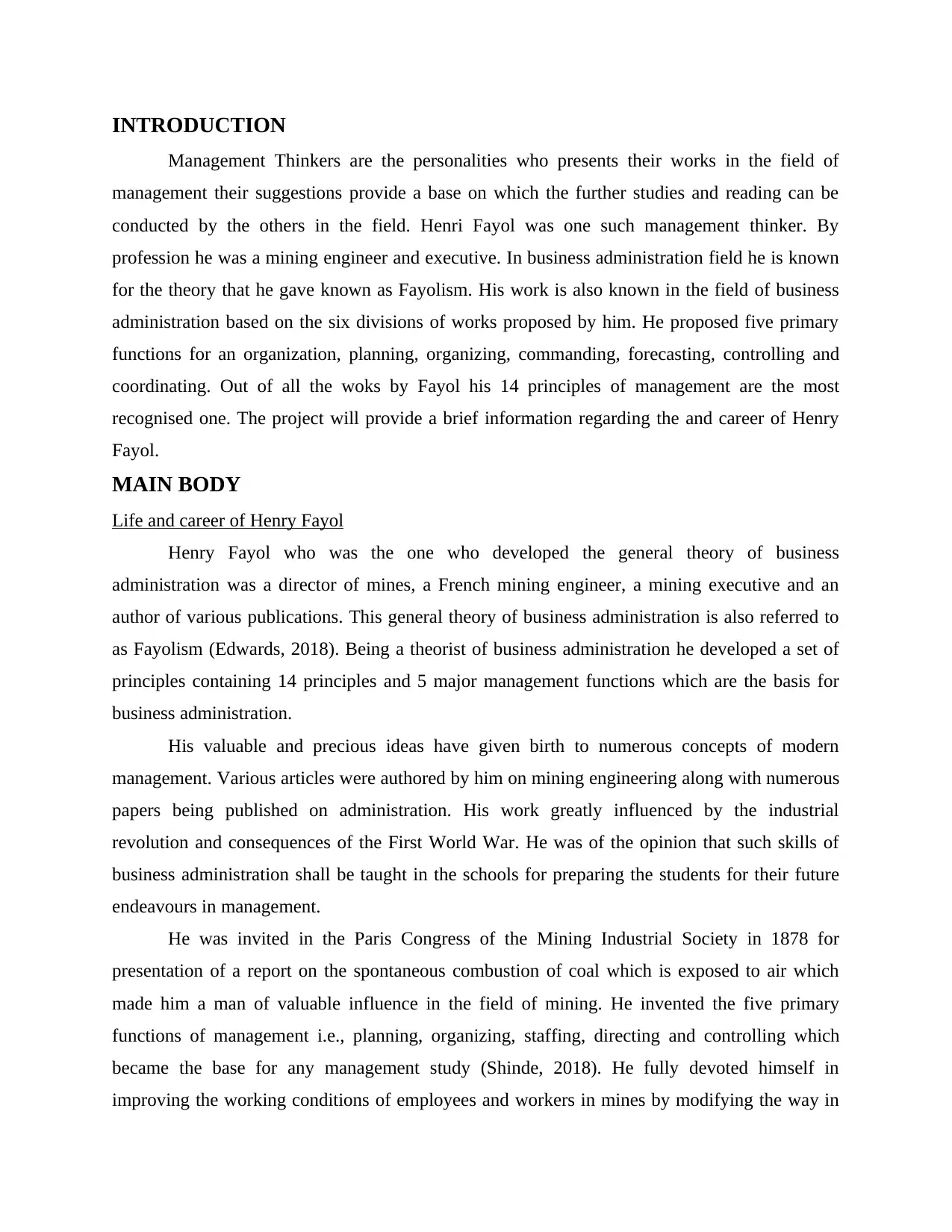
INTRODUCTION
Management Thinkers are the personalities who presents their works in the field of
management their suggestions provide a base on which the further studies and reading can be
conducted by the others in the field. Henri Fayol was one such management thinker. By
profession he was a mining engineer and executive. In business administration field he is known
for the theory that he gave known as Fayolism. His work is also known in the field of business
administration based on the six divisions of works proposed by him. He proposed five primary
functions for an organization, planning, organizing, commanding, forecasting, controlling and
coordinating. Out of all the woks by Fayol his 14 principles of management are the most
recognised one. The project will provide a brief information regarding the and career of Henry
Fayol.
MAIN BODY
Life and career of Henry Fayol
Henry Fayol who was the one who developed the general theory of business
administration was a director of mines, a French mining engineer, a mining executive and an
author of various publications. This general theory of business administration is also referred to
as Fayolism (Edwards, 2018). Being a theorist of business administration he developed a set of
principles containing 14 principles and 5 major management functions which are the basis for
business administration.
His valuable and precious ideas have given birth to numerous concepts of modern
management. Various articles were authored by him on mining engineering along with numerous
papers being published on administration. His work greatly influenced by the industrial
revolution and consequences of the First World War. He was of the opinion that such skills of
business administration shall be taught in the schools for preparing the students for their future
endeavours in management.
He was invited in the Paris Congress of the Mining Industrial Society in 1878 for
presentation of a report on the spontaneous combustion of coal which is exposed to air which
made him a man of valuable influence in the field of mining. He invented the five primary
functions of management i.e., planning, organizing, staffing, directing and controlling which
became the base for any management study (Shinde, 2018). He fully devoted himself in
improving the working conditions of employees and workers in mines by modifying the way in
Management Thinkers are the personalities who presents their works in the field of
management their suggestions provide a base on which the further studies and reading can be
conducted by the others in the field. Henri Fayol was one such management thinker. By
profession he was a mining engineer and executive. In business administration field he is known
for the theory that he gave known as Fayolism. His work is also known in the field of business
administration based on the six divisions of works proposed by him. He proposed five primary
functions for an organization, planning, organizing, commanding, forecasting, controlling and
coordinating. Out of all the woks by Fayol his 14 principles of management are the most
recognised one. The project will provide a brief information regarding the and career of Henry
Fayol.
MAIN BODY
Life and career of Henry Fayol
Henry Fayol who was the one who developed the general theory of business
administration was a director of mines, a French mining engineer, a mining executive and an
author of various publications. This general theory of business administration is also referred to
as Fayolism (Edwards, 2018). Being a theorist of business administration he developed a set of
principles containing 14 principles and 5 major management functions which are the basis for
business administration.
His valuable and precious ideas have given birth to numerous concepts of modern
management. Various articles were authored by him on mining engineering along with numerous
papers being published on administration. His work greatly influenced by the industrial
revolution and consequences of the First World War. He was of the opinion that such skills of
business administration shall be taught in the schools for preparing the students for their future
endeavours in management.
He was invited in the Paris Congress of the Mining Industrial Society in 1878 for
presentation of a report on the spontaneous combustion of coal which is exposed to air which
made him a man of valuable influence in the field of mining. He invented the five primary
functions of management i.e., planning, organizing, staffing, directing and controlling which
became the base for any management study (Shinde, 2018). He fully devoted himself in
improving the working conditions of employees and workers in mines by modifying the way in
⊘ This is a preview!⊘
Do you want full access?
Subscribe today to unlock all pages.

Trusted by 1+ million students worldwide
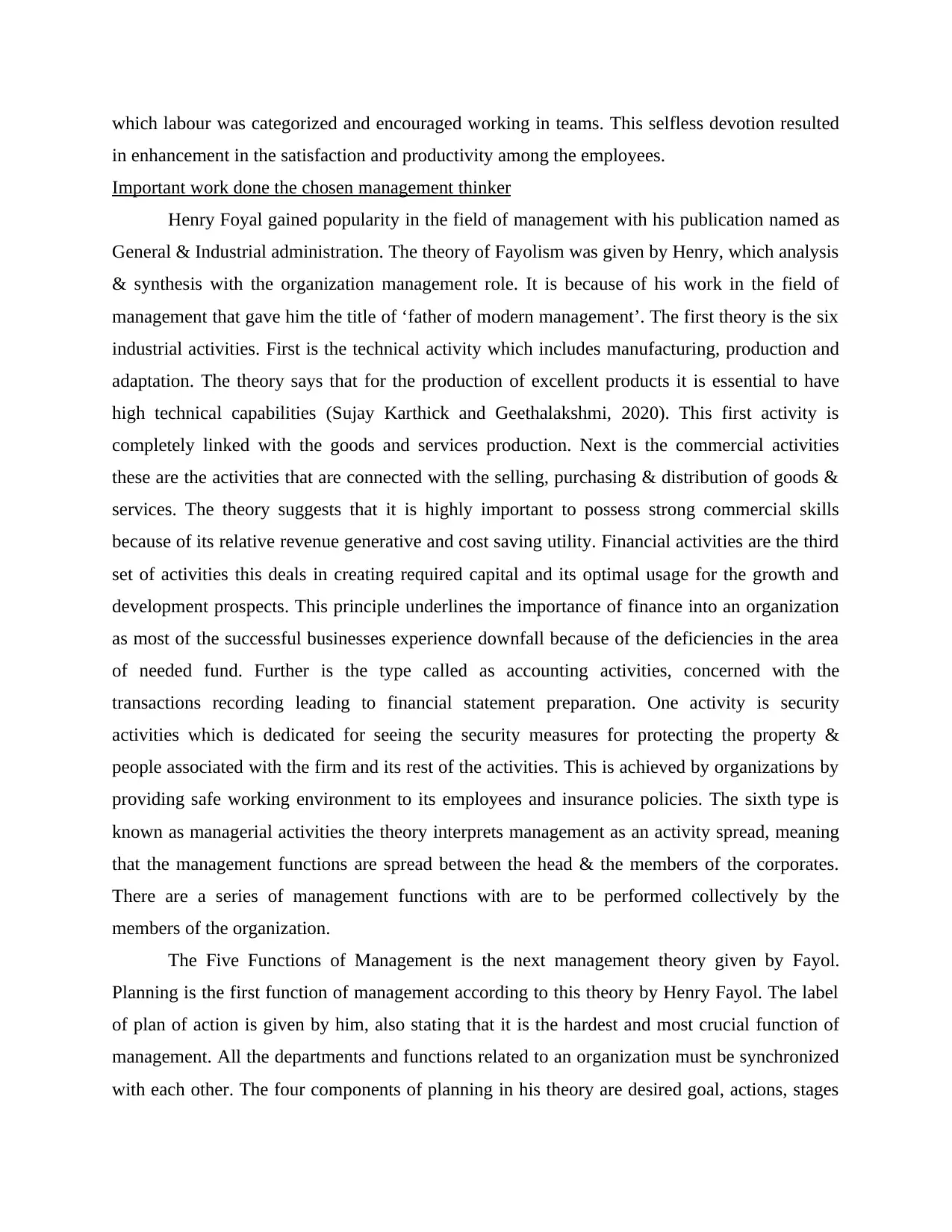
which labour was categorized and encouraged working in teams. This selfless devotion resulted
in enhancement in the satisfaction and productivity among the employees.
Important work done the chosen management thinker
Henry Foyal gained popularity in the field of management with his publication named as
General & Industrial administration. The theory of Fayolism was given by Henry, which analysis
& synthesis with the organization management role. It is because of his work in the field of
management that gave him the title of ‘father of modern management’. The first theory is the six
industrial activities. First is the technical activity which includes manufacturing, production and
adaptation. The theory says that for the production of excellent products it is essential to have
high technical capabilities (Sujay Karthick and Geethalakshmi, 2020). This first activity is
completely linked with the goods and services production. Next is the commercial activities
these are the activities that are connected with the selling, purchasing & distribution of goods &
services. The theory suggests that it is highly important to possess strong commercial skills
because of its relative revenue generative and cost saving utility. Financial activities are the third
set of activities this deals in creating required capital and its optimal usage for the growth and
development prospects. This principle underlines the importance of finance into an organization
as most of the successful businesses experience downfall because of the deficiencies in the area
of needed fund. Further is the type called as accounting activities, concerned with the
transactions recording leading to financial statement preparation. One activity is security
activities which is dedicated for seeing the security measures for protecting the property &
people associated with the firm and its rest of the activities. This is achieved by organizations by
providing safe working environment to its employees and insurance policies. The sixth type is
known as managerial activities the theory interprets management as an activity spread, meaning
that the management functions are spread between the head & the members of the corporates.
There are a series of management functions with are to be performed collectively by the
members of the organization.
The Five Functions of Management is the next management theory given by Fayol.
Planning is the first function of management according to this theory by Henry Fayol. The label
of plan of action is given by him, also stating that it is the hardest and most crucial function of
management. All the departments and functions related to an organization must be synchronized
with each other. The four components of planning in his theory are desired goal, actions, stages
in enhancement in the satisfaction and productivity among the employees.
Important work done the chosen management thinker
Henry Foyal gained popularity in the field of management with his publication named as
General & Industrial administration. The theory of Fayolism was given by Henry, which analysis
& synthesis with the organization management role. It is because of his work in the field of
management that gave him the title of ‘father of modern management’. The first theory is the six
industrial activities. First is the technical activity which includes manufacturing, production and
adaptation. The theory says that for the production of excellent products it is essential to have
high technical capabilities (Sujay Karthick and Geethalakshmi, 2020). This first activity is
completely linked with the goods and services production. Next is the commercial activities
these are the activities that are connected with the selling, purchasing & distribution of goods &
services. The theory suggests that it is highly important to possess strong commercial skills
because of its relative revenue generative and cost saving utility. Financial activities are the third
set of activities this deals in creating required capital and its optimal usage for the growth and
development prospects. This principle underlines the importance of finance into an organization
as most of the successful businesses experience downfall because of the deficiencies in the area
of needed fund. Further is the type called as accounting activities, concerned with the
transactions recording leading to financial statement preparation. One activity is security
activities which is dedicated for seeing the security measures for protecting the property &
people associated with the firm and its rest of the activities. This is achieved by organizations by
providing safe working environment to its employees and insurance policies. The sixth type is
known as managerial activities the theory interprets management as an activity spread, meaning
that the management functions are spread between the head & the members of the corporates.
There are a series of management functions with are to be performed collectively by the
members of the organization.
The Five Functions of Management is the next management theory given by Fayol.
Planning is the first function of management according to this theory by Henry Fayol. The label
of plan of action is given by him, also stating that it is the hardest and most crucial function of
management. All the departments and functions related to an organization must be synchronized
with each other. The four components of planning in his theory are desired goal, actions, stages
Paraphrase This Document
Need a fresh take? Get an instant paraphrase of this document with our AI Paraphraser
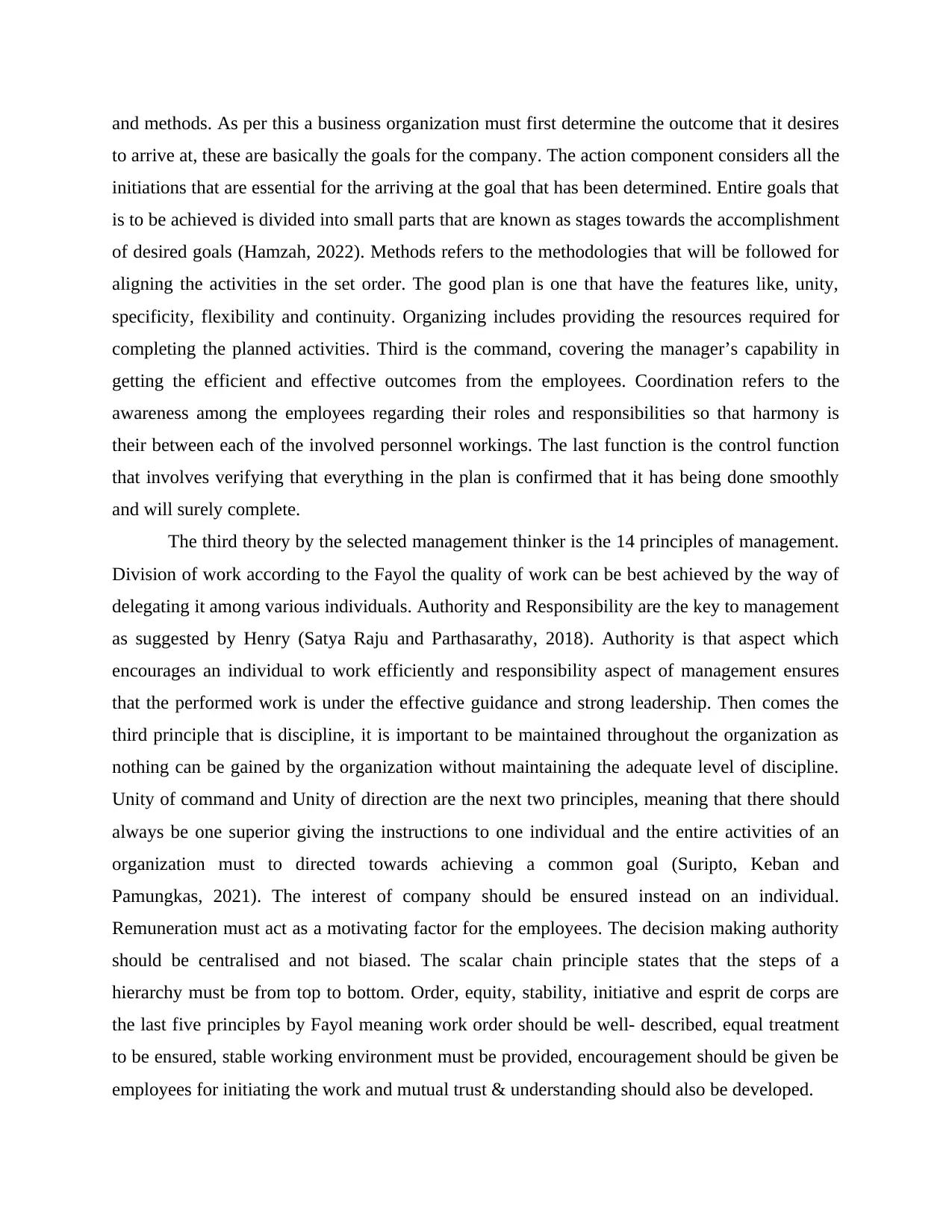
and methods. As per this a business organization must first determine the outcome that it desires
to arrive at, these are basically the goals for the company. The action component considers all the
initiations that are essential for the arriving at the goal that has been determined. Entire goals that
is to be achieved is divided into small parts that are known as stages towards the accomplishment
of desired goals (Hamzah, 2022). Methods refers to the methodologies that will be followed for
aligning the activities in the set order. The good plan is one that have the features like, unity,
specificity, flexibility and continuity. Organizing includes providing the resources required for
completing the planned activities. Third is the command, covering the manager’s capability in
getting the efficient and effective outcomes from the employees. Coordination refers to the
awareness among the employees regarding their roles and responsibilities so that harmony is
their between each of the involved personnel workings. The last function is the control function
that involves verifying that everything in the plan is confirmed that it has being done smoothly
and will surely complete.
The third theory by the selected management thinker is the 14 principles of management.
Division of work according to the Fayol the quality of work can be best achieved by the way of
delegating it among various individuals. Authority and Responsibility are the key to management
as suggested by Henry (Satya Raju and Parthasarathy, 2018). Authority is that aspect which
encourages an individual to work efficiently and responsibility aspect of management ensures
that the performed work is under the effective guidance and strong leadership. Then comes the
third principle that is discipline, it is important to be maintained throughout the organization as
nothing can be gained by the organization without maintaining the adequate level of discipline.
Unity of command and Unity of direction are the next two principles, meaning that there should
always be one superior giving the instructions to one individual and the entire activities of an
organization must to directed towards achieving a common goal (Suripto, Keban and
Pamungkas, 2021). The interest of company should be ensured instead on an individual.
Remuneration must act as a motivating factor for the employees. The decision making authority
should be centralised and not biased. The scalar chain principle states that the steps of a
hierarchy must be from top to bottom. Order, equity, stability, initiative and esprit de corps are
the last five principles by Fayol meaning work order should be well- described, equal treatment
to be ensured, stable working environment must be provided, encouragement should be given be
employees for initiating the work and mutual trust & understanding should also be developed.
to arrive at, these are basically the goals for the company. The action component considers all the
initiations that are essential for the arriving at the goal that has been determined. Entire goals that
is to be achieved is divided into small parts that are known as stages towards the accomplishment
of desired goals (Hamzah, 2022). Methods refers to the methodologies that will be followed for
aligning the activities in the set order. The good plan is one that have the features like, unity,
specificity, flexibility and continuity. Organizing includes providing the resources required for
completing the planned activities. Third is the command, covering the manager’s capability in
getting the efficient and effective outcomes from the employees. Coordination refers to the
awareness among the employees regarding their roles and responsibilities so that harmony is
their between each of the involved personnel workings. The last function is the control function
that involves verifying that everything in the plan is confirmed that it has being done smoothly
and will surely complete.
The third theory by the selected management thinker is the 14 principles of management.
Division of work according to the Fayol the quality of work can be best achieved by the way of
delegating it among various individuals. Authority and Responsibility are the key to management
as suggested by Henry (Satya Raju and Parthasarathy, 2018). Authority is that aspect which
encourages an individual to work efficiently and responsibility aspect of management ensures
that the performed work is under the effective guidance and strong leadership. Then comes the
third principle that is discipline, it is important to be maintained throughout the organization as
nothing can be gained by the organization without maintaining the adequate level of discipline.
Unity of command and Unity of direction are the next two principles, meaning that there should
always be one superior giving the instructions to one individual and the entire activities of an
organization must to directed towards achieving a common goal (Suripto, Keban and
Pamungkas, 2021). The interest of company should be ensured instead on an individual.
Remuneration must act as a motivating factor for the employees. The decision making authority
should be centralised and not biased. The scalar chain principle states that the steps of a
hierarchy must be from top to bottom. Order, equity, stability, initiative and esprit de corps are
the last five principles by Fayol meaning work order should be well- described, equal treatment
to be ensured, stable working environment must be provided, encouragement should be given be
employees for initiating the work and mutual trust & understanding should also be developed.
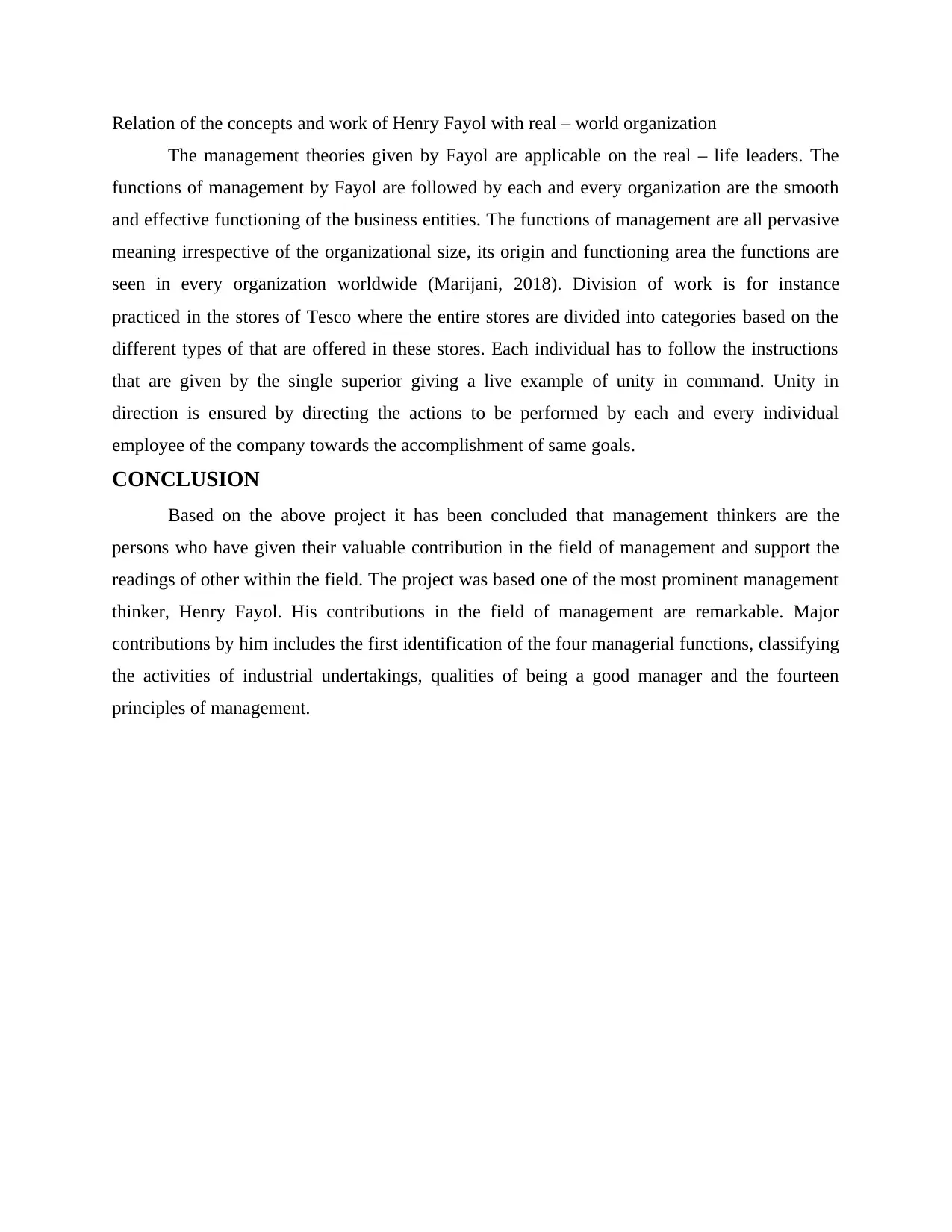
Relation of the concepts and work of Henry Fayol with real – world organization
The management theories given by Fayol are applicable on the real – life leaders. The
functions of management by Fayol are followed by each and every organization are the smooth
and effective functioning of the business entities. The functions of management are all pervasive
meaning irrespective of the organizational size, its origin and functioning area the functions are
seen in every organization worldwide (Marijani, 2018). Division of work is for instance
practiced in the stores of Tesco where the entire stores are divided into categories based on the
different types of that are offered in these stores. Each individual has to follow the instructions
that are given by the single superior giving a live example of unity in command. Unity in
direction is ensured by directing the actions to be performed by each and every individual
employee of the company towards the accomplishment of same goals.
CONCLUSION
Based on the above project it has been concluded that management thinkers are the
persons who have given their valuable contribution in the field of management and support the
readings of other within the field. The project was based one of the most prominent management
thinker, Henry Fayol. His contributions in the field of management are remarkable. Major
contributions by him includes the first identification of the four managerial functions, classifying
the activities of industrial undertakings, qualities of being a good manager and the fourteen
principles of management.
The management theories given by Fayol are applicable on the real – life leaders. The
functions of management by Fayol are followed by each and every organization are the smooth
and effective functioning of the business entities. The functions of management are all pervasive
meaning irrespective of the organizational size, its origin and functioning area the functions are
seen in every organization worldwide (Marijani, 2018). Division of work is for instance
practiced in the stores of Tesco where the entire stores are divided into categories based on the
different types of that are offered in these stores. Each individual has to follow the instructions
that are given by the single superior giving a live example of unity in command. Unity in
direction is ensured by directing the actions to be performed by each and every individual
employee of the company towards the accomplishment of same goals.
CONCLUSION
Based on the above project it has been concluded that management thinkers are the
persons who have given their valuable contribution in the field of management and support the
readings of other within the field. The project was based one of the most prominent management
thinker, Henry Fayol. His contributions in the field of management are remarkable. Major
contributions by him includes the first identification of the four managerial functions, classifying
the activities of industrial undertakings, qualities of being a good manager and the fourteen
principles of management.
⊘ This is a preview!⊘
Do you want full access?
Subscribe today to unlock all pages.

Trusted by 1+ million students worldwide
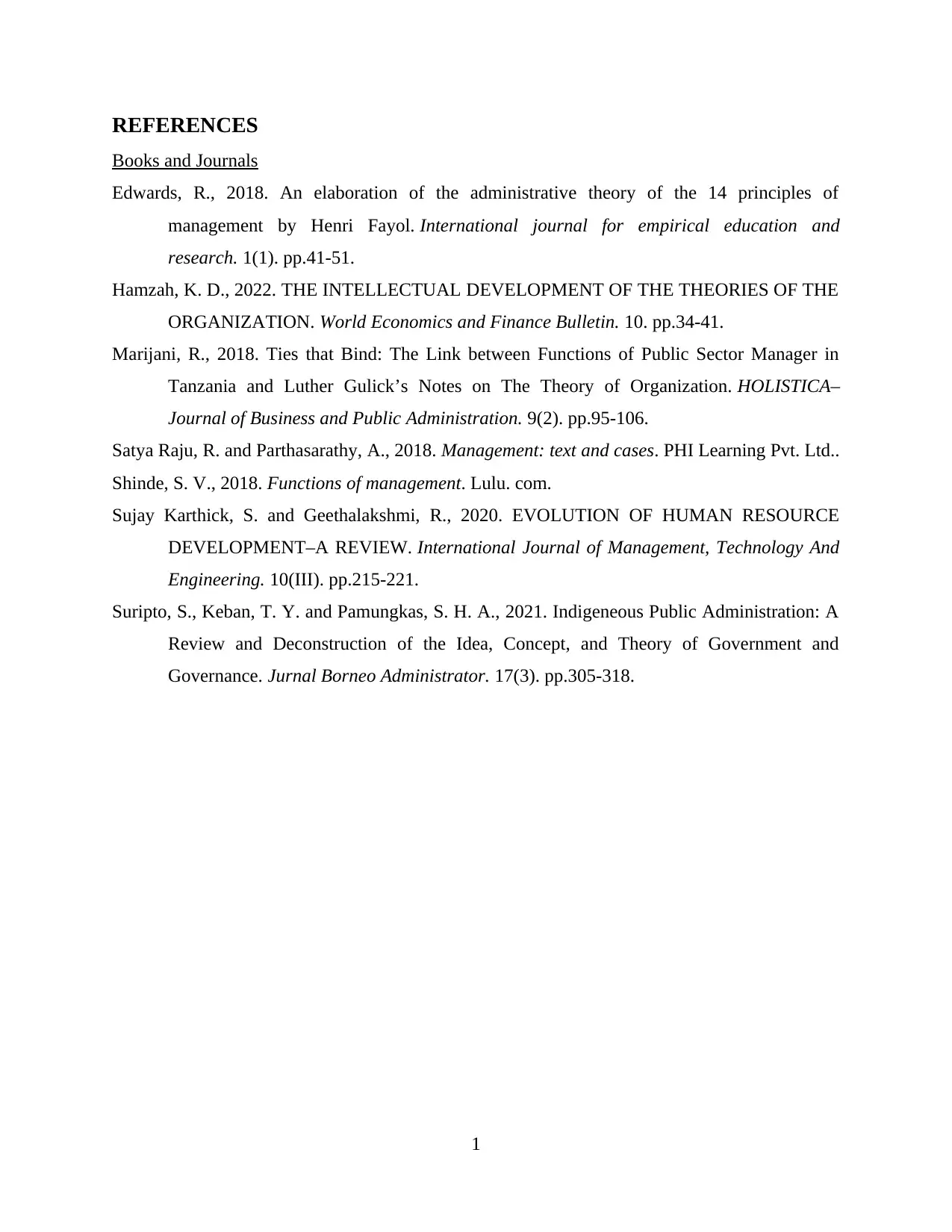
REFERENCES
Books and Journals
Edwards, R., 2018. An elaboration of the administrative theory of the 14 principles of
management by Henri Fayol. International journal for empirical education and
research. 1(1). pp.41-51.
Hamzah, K. D., 2022. THE INTELLECTUAL DEVELOPMENT OF THE THEORIES OF THE
ORGANIZATION. World Economics and Finance Bulletin. 10. pp.34-41.
Marijani, R., 2018. Ties that Bind: The Link between Functions of Public Sector Manager in
Tanzania and Luther Gulick’s Notes on The Theory of Organization. HOLISTICA–
Journal of Business and Public Administration. 9(2). pp.95-106.
Satya Raju, R. and Parthasarathy, A., 2018. Management: text and cases. PHI Learning Pvt. Ltd..
Shinde, S. V., 2018. Functions of management. Lulu. com.
Sujay Karthick, S. and Geethalakshmi, R., 2020. EVOLUTION OF HUMAN RESOURCE
DEVELOPMENT–A REVIEW. International Journal of Management, Technology And
Engineering. 10(III). pp.215-221.
Suripto, S., Keban, T. Y. and Pamungkas, S. H. A., 2021. Indigeneous Public Administration: A
Review and Deconstruction of the Idea, Concept, and Theory of Government and
Governance. Jurnal Borneo Administrator. 17(3). pp.305-318.
1
Books and Journals
Edwards, R., 2018. An elaboration of the administrative theory of the 14 principles of
management by Henri Fayol. International journal for empirical education and
research. 1(1). pp.41-51.
Hamzah, K. D., 2022. THE INTELLECTUAL DEVELOPMENT OF THE THEORIES OF THE
ORGANIZATION. World Economics and Finance Bulletin. 10. pp.34-41.
Marijani, R., 2018. Ties that Bind: The Link between Functions of Public Sector Manager in
Tanzania and Luther Gulick’s Notes on The Theory of Organization. HOLISTICA–
Journal of Business and Public Administration. 9(2). pp.95-106.
Satya Raju, R. and Parthasarathy, A., 2018. Management: text and cases. PHI Learning Pvt. Ltd..
Shinde, S. V., 2018. Functions of management. Lulu. com.
Sujay Karthick, S. and Geethalakshmi, R., 2020. EVOLUTION OF HUMAN RESOURCE
DEVELOPMENT–A REVIEW. International Journal of Management, Technology And
Engineering. 10(III). pp.215-221.
Suripto, S., Keban, T. Y. and Pamungkas, S. H. A., 2021. Indigeneous Public Administration: A
Review and Deconstruction of the Idea, Concept, and Theory of Government and
Governance. Jurnal Borneo Administrator. 17(3). pp.305-318.
1
1 out of 7
Related Documents
Your All-in-One AI-Powered Toolkit for Academic Success.
+13062052269
info@desklib.com
Available 24*7 on WhatsApp / Email
![[object Object]](/_next/static/media/star-bottom.7253800d.svg)
Unlock your academic potential
Copyright © 2020–2026 A2Z Services. All Rights Reserved. Developed and managed by ZUCOL.



